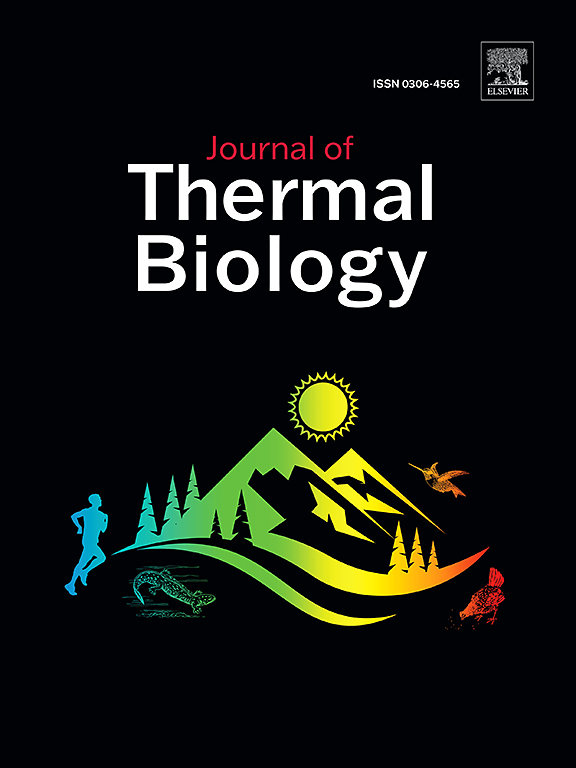Thermal tolerance of Aedes aegypti mosquito eggs is associated with urban adaptation and human interactions
IF 2.9
2区 生物学
Q2 BIOLOGY
引用次数: 0
Abstract
Climate change will profoundly affect mosquito distributions and their ability to serve as vectors for disease, specifically with the anticipated increase in heat waves. The rising temperature and frequent heat waves can accelerate mosquito life cycles, facilitating higher disease transmission. Conversely, higher temperatures could increase mosquito mortality as a negative consequence. Warmer temperatures are associated with urbanized areas, suggesting a need for anthropophilic mosquitoes to adapt to be more hardy to heat stress. Mosquito eggs provide an opportunity to study the biological impact of climate warming as this stage is stationary and must tolerate temperatures at the site of female oviposition. As such, egg thermotolerance is critical for survival in a specific habitat. In nature, Aedes mosquitoes exhibit different behavioral phenotypes, where specific populations prefer depositing eggs in tree holes and prefer feeding non-human vertebrates. In contrast, others, particularly human-biting specialists, favor laying eggs in artificial containers near human dwellings. This study examined the thermotolerance of eggs, along with larval and adult stages, for Aedes aegypti lineages associated with known ancestry and shifts in their host preferences. Mosquitoes collected from areas with high human density showed increased egg viability following high-temperature stress, and a similar, yet more muted effect was noted in larvae. Unlike eggs and larvae, thermal tolerance among adults showed no significant correlation based on the area of collection or human-association. This study underscores that urbanization is a major driver of egg thermotolerance, highlighting the egg stage is likely critical to mosquito survival when associated with humans and needs to be accounted for when predicting future mosquito distribution.

埃及伊蚊卵的耐热性与城市适应和人类互动有关
气候变化将深刻影响蚊子的分布及其作为疾病传播媒介的能力,特别是预计热浪将增加。气温上升和频繁的热浪会加快蚊子的生命周期,促进疾病的传播。相反,高温可能会增加蚊子的死亡率,这是一个负面后果。气温升高与城市化地区有关,这表明亲人类的蚊子需要适应更强的热应激。蚊子卵为研究气候变暖的生物学影响提供了一个机会,因为这一阶段是静止的,并且必须忍受雌性产卵地点的温度。因此,鸡蛋的耐热性对在特定栖息地的生存至关重要。在自然界中,伊蚊表现出不同的行为表型,其中特定种群更喜欢在树洞中产卵,更喜欢捕食非人类脊椎动物。相比之下,其他人,尤其是咬人专家,喜欢在人类住所附近的人工容器中产卵。本研究考察了埃及伊蚊谱系与已知祖先和寄主偏好变化相关的卵、幼虫期和成虫期的耐热性。从人口密度高的地区收集的蚊子在高温胁迫后显示出卵活力增加,并且在幼虫中发现了类似但更微弱的影响。与卵和幼虫不同的是,成虫的热耐受性与采集地和人的接触没有显著的相关性。这项研究强调了城市化是蚊子耐热性的主要驱动因素,强调了卵子阶段可能对蚊子的生存至关重要,当与人类有关时,需要在预测未来蚊子分布时加以考虑。
本文章由计算机程序翻译,如有差异,请以英文原文为准。
求助全文
约1分钟内获得全文
求助全文
来源期刊

Journal of thermal biology
生物-动物学
CiteScore
5.30
自引率
7.40%
发文量
196
审稿时长
14.5 weeks
期刊介绍:
The Journal of Thermal Biology publishes articles that advance our knowledge on the ways and mechanisms through which temperature affects man and animals. This includes studies of their responses to these effects and on the ecological consequences. Directly relevant to this theme are:
• The mechanisms of thermal limitation, heat and cold injury, and the resistance of organisms to extremes of temperature
• The mechanisms involved in acclimation, acclimatization and evolutionary adaptation to temperature
• Mechanisms underlying the patterns of hibernation, torpor, dormancy, aestivation and diapause
• Effects of temperature on reproduction and development, growth, ageing and life-span
• Studies on modelling heat transfer between organisms and their environment
• The contributions of temperature to effects of climate change on animal species and man
• Studies of conservation biology and physiology related to temperature
• Behavioural and physiological regulation of body temperature including its pathophysiology and fever
• Medical applications of hypo- and hyperthermia
Article types:
• Original articles
• Review articles
 求助内容:
求助内容: 应助结果提醒方式:
应助结果提醒方式:


